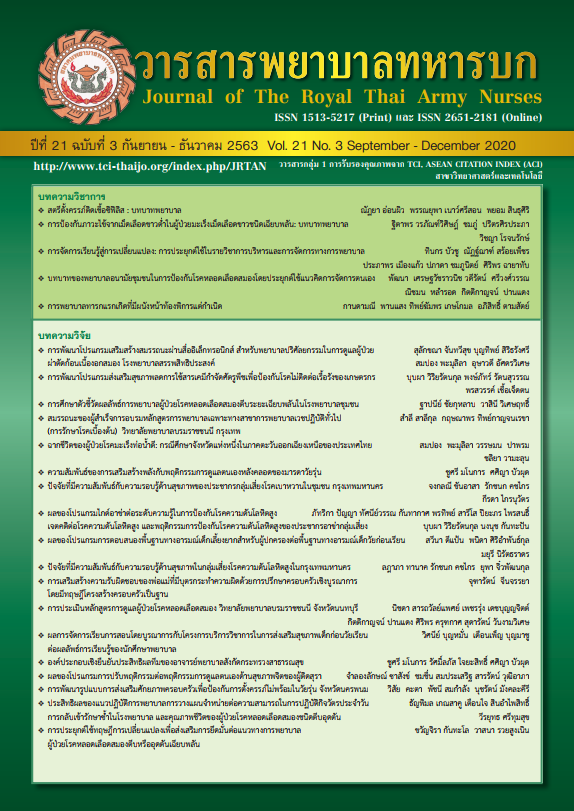Life Scenes of Patients with Cholangiocarcinoma: A Case Study of One Province in The Northeast of Thailand
Keywords:
Life scene, Cholangiocarcinoma, Characteristics of patients with Cholangiocarcinoma, Lifestyle of patientsAbstract
This qualitative study aimed to describe the life scenes of patients with cholangiocarcinoma living in a province in the Northeast of Thailand. The informants were 38 patients with cholangiocarcinoma and their family members selected by a purposive sampling method. Data were collected by in-depth interviews, and analyzed by content analysis based on Giorgi’s guidelines. The results showed that the life scenes of patients with cholangiocarcinoma consisted of 2 main issues: (1) 3 characteristics of patients with cholangiocarcinoma, namely 1) those who have not yet had symptoms but the disease has accidentally detected, 2) those with mild symptoms similar to gastric disease, and 3) those with severe symptoms; and (2) 4 types of lifestyle of patients with cholangiocarcinoma: 1) living alone, 2) staying with family, 3) having self-care for not suffering and 4) trying to stay alive for as long as possible. The results of the study can be used as the guidelines for caring for patients with cholangiocarcinoma and can be the proposal for the integration of knowledge in caring for patients with cholangiocarcinoma between the professional sector and the public sector.
Downloads
References
The Task Force of Health data and Information, Bureau of Policy and Strategy. Number and mortality rate per 100,000 population based on of the first 10 causes of death group (according to International Statistical Classification of Diseases: 10th Edition) 2015-2017. Thailand: Bureau of Policy and Strategy; 2015. (in Thai)
Cancer Registry Unit, Sapphasitthiprasong Hospital. Statistics of cancer patients admitted in the years 2013-2014. Ubon Ratchathani: Sapphasitthiprasong Hospital; 2019. (in Thai)
Khuntikeo N, Pugkhem A. Current Treatment of Cholangiocarcinoma. Srinagarind Med J. 2012; 27(3): 340-50. (in Thai)
Bhudhisawasdi V, Khuntikeo N, Chur-in S, Pugkhem A, Talabnin C, Wongkham S. Cholangiocarcinoma: Experience of Srinagarind Hospital. Srinagarind Med J. 2012; 27. (in Thai)
Khuntikeo N, Yongvanit P. Conceptual framework of health policy and strategies to administer and manage cholangiocarcinoma systematically and effectively. Srinagarind Med J. 2012; 27(suppl): 422-26. (in Thai)
Khon Kaen University, National Health Security Office and Ministry of Public Health. Strategies to reduce liver fluke and eliminate cholangiocarcinoma of Isan people. Khon Kaen: Faculty of Medicine, Khon Kaen University. 2012. (in Thai)
Fan SY, Eiser C. Illness experience in patients with hepatocellular carcinoma: an interpretative phenomenological analysis study. Eur J Gastroenterol Hepatol. 2012; 24(2): 203-208.
Kuchaisit C, et al. Systematic care management for enhancing the quality of life in patients with cholangiocarcinoma admitted to Srinagarind Hospital. Khon Kaen: Siriphan Offset; 2004. (in Thai)
Juangpanich U, Tawasee A, Kanasen S, Sukumarn S. Development of self-care agency model in cholangiocarcinoma patients receiving chemotherapy. Rama Nurs J. 2004; 12(1): 49-65. (in Thai)
Kleinman A. Patients and healers in the context of culture. London: University of California. 1980.
Giorgi, A. Phenomenology and psychological research. Pittsburgh, Pennsylvania: Duquesne University Press; 1985.
Guba EG, Lincoln YS. Fourth generation evaluation. Newbury Park, CA: Sage Publications. 1989.
Chaiveerawattana A, Sukyothin S, Kornlak A, Kuhaprema T. Guidelines for screening, diagnosis and treatment of liver cancer and cholangiocarcinoma. 2nd edition. Bangkok: National Office of Buddhism. 2011. (in Thai)
Pamulila S, Bumpenchit S. Care system for patients with cholangiocarcinoma. Journal of Nursing Science and Health. 2017; 40(3): 83-95. (in Thai)
Araya T, Bumpenchit S. Life scene of older persons with end of life in community. Journal of Nursing Science and Health. 2017; 40(4): 83-95. (in Thai)
Krongchai A, Oumtanec A. Experiences of transcultural nursing care in arabic words of private hospital. Journal of The Royal Thai Army Nurses. 2019;21(1).356-365.(in Thai)
Downloads
Published
How to Cite
Issue
Section
License
บทความหรือข้อคิดเห็นใดใดที่ปรากฏในวารสารพยาบาลทหารบกเป็นวรรณกรรมของผู้เขียน ซึ่งบรรณาธิการหรือสมาคมพยาบาลทหารบก ไม่จำเป็นต้องเห็นด้วย
บทความที่ได้รับการตีพิมพ์เป็นลิขสิทธิ์ของวารสารพยาบาลทหารบก
The ideas and opinions expressed in the Journal of The Royal Thai Army Nurses are those of the authors and not necessarily those
of the editor or Royal Thai Army Nurses Association.






